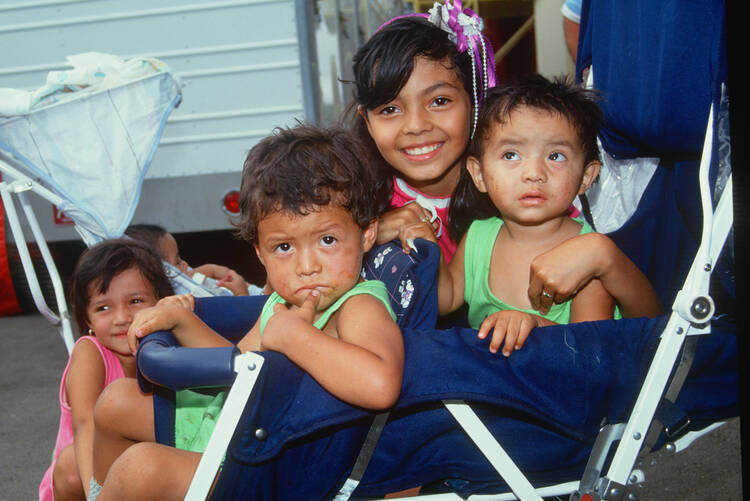In my work with Hispanic families through Catholic Charities, I see and hear the struggles of migrants living in our mid-size Midwestern city. Their story isn’t all that much different than migrants living in other cities across the country. Individuals from Central America, mostly Mexico in our case, arrive at a primary city, usually in Texas or California, and then find their way to us through a friend or family member already settled here, perhaps drawn here because of our cheap cost of living and stable economy.
As the Synod on the Family unfolds in Rome, much of the media attention has focused on issues that drive the culture wars and talking points in American Catholicism: namely issues of human sexuality. But a narrative change is in order. It’s imperative that we view family life and the synod with the “option for the poor” as our lens to inform the very real strains that the poorest and most vulnerable Catholic families are facing today, especially immigrants. As a society and as a church, we should be judged by how we treat and attend to the least and most marginalized of our brothers and sisters. These families must be our starting point for any conversation on the family. If we fail to attend to the very urgent needs of the most vulnerable Catholic families, anything we do for middle or upper-middle class Catholics will ring hollow.
Recently, a panel discussion at Georgetown University called “It’s the Economy, Synod!” addressed the economy and its impact on family life. The panelists rightly highlighted some themes from Pope Francis’s “Laudato Si’” as well as his other public remarks on threats to family life, which include forced migration, injurious immigration policies, war and violence, youth unemployment and climate change.
I’ve seen the strain these issues have on the family unit first hand. The detetioration of the family unit is happening among the most marginalized Catholics in our midst and, frankly, our dioceses aren’t equipped to deal with it. And I’m not talking about providing material assistance such as food or rental assistance, which our church actually does pretty well. Where we fail as a church is in addressing the systemic issues facing our immigrant brothers and sisters, and mobilizing vibrant and thriving families (usually found in vibrant and thriving parishes) to walk in solidarity with the migrants in our midst.
A big issue in the media in the lead up to the synod on the family was the issue of communion for divorced and remarried Catholics. This is, of course, an important pastoral issue given the fact more than 40 percent of marriages across society end in divorce. However, our typical middle-class way of thinking about marriage and family life is simply not sufficient. For example, many of the immigrant families I serve were never married in their home country due to the cost of a church wedding and celebration. Others were only civilly married before coming to the United States and never followed through with a church wedding here. And for others, they were simply living together as a couple in their home country when they came to the United States, spending their life savings to get here and then remained together in a common-law marriage.
Amidst this categorical and sacramental ambiguity, migrants must contend with harsh immigration policies, difficult economic conditions and the strain of living in some of the worst and most violent neighborhoods in the United States. It is not surprising that they suffer from high rates of domestic violence, alcohol and drug abuse, and all of the well-documented effects that poverty has on the raising of children.
Stories of Suffering
Recently, a client came to me and told me she was in a dead-end marriage and the victim of severe emotional abuse. She told me that she couldn’t leave her abusive and controlling husband because she was undocumented and would never be able support her children on her own. She felt economically tied to him, and was willing to suffer the consequences if it meant her children had a roof over their head and food to eat.
Another mother came to me in tears, saying that she was devastated that her son who was serving a short jail sentence would have to go back to Mexico after getting out of prison—not because he was undocumented, but because his gang in the United States demanded a re-initiation upon release. They wanted him to take another’s innocent life to prove his loyalty. He refused. And so the gang swore they would kill him for his disobedience. Together with his probation officer, the young man decided it would be best for him to go live in Mexico with his grandparents. His mother, who is undocumented, can’t risk the trip to Mexico to visit him. She was devastated.
In yet another case, a woman’s husband was deported, leaving her with three young children to take care of and no job. She moved in with her sister and is just trying to get by one day at a time. She confessed to me over tears that she fears her young children will grow up their whole lives without their father.
There are no easy answers to these cases. Pope Francis in “Laudato Si’” reminds us that everything is connected. An integral ecology and theology of the family must make the connection that all of us are responsible as families—and as members of the mystical Body of Christ—for one another. I imagine the families I see in my office everyday won’t be watching the news to see if divorced and remarried Catholics are permitted to receive the Eucharist. I have a feeling they’ll be praying instead that we all come together to realize our interconnectedness in the Body of Christ. The success of the Synod on the Family will be judged by how we join together to heal those families who suffer silently as the least among us.








